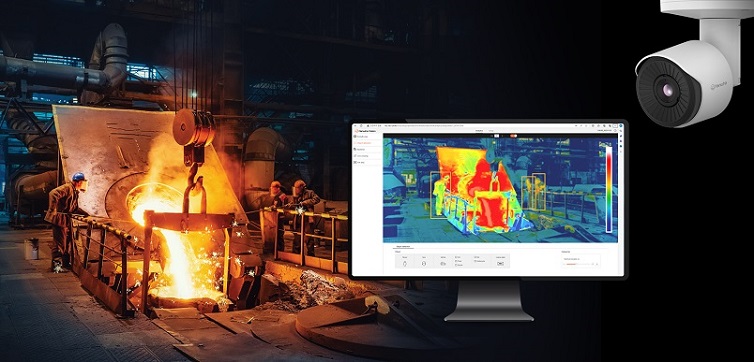Hanwha Vision Launches New AI-Based Radiometric Thermal Cameras
News | 16.01.2024
Hanwha Vision, a global vision solution provider, ignites a new era of precision and safety in critical industries with its advanced AI-powered radiometric thermal camera lineups. These next-generation devices transcend basic security, seamlessly fusing cutting-edge artificial intelligence with temperature detection and high-performance imaging to deliver unparalleled solutions for power plants, factories, and oil and gas utilities.
Clear image with high-performance detector
Featuring artificial intelligence, Hanwha Vision‘s radiometric thermal camera offers a QVGA (384×288) resolution with a 17μm size detector and outstanding 30mK NETD (Noise Equivalent Temperature Difference) performance.
This remarkably low NETD value allows the camera to capture clear and detailed images even in challenging lighting conditions, including low light, smoke, and fog, making them suitable for critical environments.
Wide Temperature Detection Range
Hanwha Vision’s radiometric thermal cameras, with a temperature detection range of -40°C to 550°C, are ideal for diverse industrial applications.
Effectively monitoring industrial equipment and materials, they ensure safe operation. By detecting temperature changes due to aging or connection failure, the cameras empower operators to promptly address potential problems, enhancing maintenance efficiency and reducing downtime. The integration of Hanwha Vision’s thermal camera technology proactively identifies issues, eliminating the need for on-site inspections and streamlining the detection and assessment process. Furthermore, the cameras’ high-temperature area detection aids in monitoring processes with elevated temperature materials, contributing to improved process quality and safety.
AI-Based Object Classification in Thermal Imaging

While AI features are becoming increasingly prevalent in visible cameras, integrating them into thermal cameras provides even greater benefits for enhanced monitoring. The newly released thermal camera features AI-powered object detection that accurately classifies people and vehicles even under challenging conditions. This capability enables the camera to detect and classify people in extreme situations, such as fog or smoke, effectively preventing accidents.
More flexible option for commercial use
The new AI-based radiometric thermal cameras are available in two variants: 30fps and 8fps. Thermal cameras tailored for products with a 30fps frame rate fall under the Wassenaar Arrangement, necessitating various permits for export/import, even for security purposes.
In contrast, cameras with a frame rate below 9fps are not classified as ‘sensitive’ and can be exported/imported more freely. This makes Hanwha Vision’s 8fps thermal cameras a flexible option for commercial use.
Advantages of AI-based radiometric thermal cameras in critical infrastructure: enhancing industrial monitoring
These AI-powered radiometric thermal cameras pierce through darkness, smoke, and even the harsh conditions of industrial environments, such as power plants, factories, ports, oil & gas utilities.
Equipment Monitoring
In power plants, factories, and ports, these cameras can continuously monitor critical equipment for overheating, leaks, or other anomalies. Early detection of temperature changes can prevent equipment failures, accidents, and production downtime. AI can further automate anomaly detection and alert operators to potential issues.
Process Monitoring
AI-based radiometric thermal cameras can monitor industrial processes like conveyor belts, pipelines, and furnaces. Tracking temperature variations and object movement can ensure process efficiency, detect product defects, and identify potential safety hazards. AI can analyze
Fire Detection
The new AI-based radiometric thermal cameras can detect fires at early stages, even in total darkness or smoky conditions, thanks to their ability to sense heat signatures. This rapid detection can trigger alarms and firefighting protocols, minimizing damage and risk to personnel. AI can differentiate between fire and other heat sources, reducing false alarms. The cameras can also monitor cargo temperature, detecting elevated temperatures, to prevent containers and bulk cargo from fires, explosions, and spoilage.
Perimeter Security
AI-based radiometric thermal cameras can monitor fences, entry points, and restricted areas in critical infrastructure to detect unauthorized access or intrusions, even in low-light or challenging conditions.
AI-powered object classification can accurately identify people and vehicles, reducing false alarms and improving security response. The new lineup also detects unauthorized personnel and vessels, even in low-light or challenging maritime conditions like fog or rain. AI-powered object classification accurately identifies intruders, reducing false alarms and streamlining security response. AI-based radiometric thermal cameras also pierce through darkness and harsh weather, providing clear visuals for safe navigation and docking, especially during nighttime or low-visibility conditions.







